| SHADOWS ON THE WALL | REVIEWS | NEWS | FESTIVAL | AWARDS | Q&A | ABOUT | TALKBACK | |||||
 Shadows off the beaten path Shadows off the beaten pathIndies, foreign, docs and shorts...
On this page:
JULIE KEEPS QUIET |
PARTHENOPE |
TWO TO ONE
| |||||
| See also: SHADOWS FILM FESTIVAL | Last update 30.Apr.25 | |||||
|
Julie Keeps Quiet Julie Zwijgt Review by Rich Cline | 
| |||||
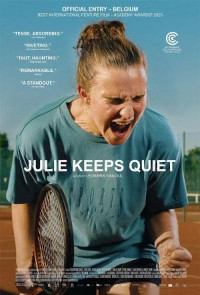 dir Leonardo van Dijl scr Leonardo Van Dijl, Ruth Becquart prd Gilles Coulier, Gilles De Schryver, Wouter Sap with Tessa Van den Broeck, Ruth Becquart, Koen De Bouw, Pierre Gervais, Claire Bodson, Grace Biot, Alyssa Lorette, Laurent Caron, Noah Lecloux, Luca de Maar, Qays Jahier, Tommy Buyl release Bel 18.Sep.24, US 28.Mar.25, UK 25.Apr.25 24/Belgium 1h40 CANNES FILM FEST TORONTO FILM FEST  Is it streaming? |
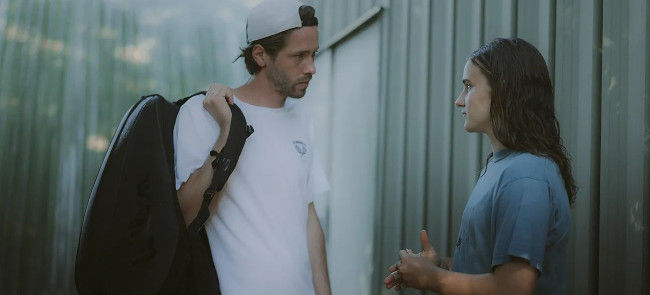 Skilfully shot in a strikingly stark style that fine-tunes our attention into each scene, this Belgian drama allows its darker themes to emerge gradually and almost insidiously. Taking the perspective of a teen girl, director Leonardo van Dijl observes details with an eagle eye, catching information the characters haven't yet noticed. It's a strikingly low-key, visually inventive film that tells its story in an unusually vivid way. At an elite tennis academy, the students are thrown when coach Jeremy (Caron) is suddenly suspended after a classmate's suicide. The highest-ranked teen, Julie (Van den Broeck), is annoyed that she now has to train with assistant coach Backie (Gervais) for an upcoming tournament. So she secretly keeps in contact with Jeremy, who protests his innocence and insists that he'll be back soon. But while other students speak to officials who are investigating him, Julie opts out. Her parents (Becouart and De Bouw) support her decision, but this causes worries for school director Sophie (Bodson). There's a still, sharp tone to the film that adds an almost documentary sensibility, even as a strong sense of drama churns underneath. Key details add to the realism, such as how Julie repeatedly watches a video her late classmate made, looking for clues. But Julie completely internalises her feelings about this situation, only asking a few questions while quietly moving on with her development as a rising star competitor. So it's chilling to see the way this situation develops around her. As Julie, Van den Broeck has terrific presence on-screen, bringing out Julie's internal struggle as she becomes the centre of attention. This only reminds her that she's from a working class family, unlike her wealthy teammates. While being very hard on herself, her stoic face says everything, as she listens to others speak while grappling with internal feelings she simply can't express. The people around her remain deliberately outside her focus. This is a fascinating look through the point of view of a young person who has plenty of people who want to help her talk through a serious issue, but she instead decides to hold it inside. Seeing Julie's struggle, her mother whispers, "I can't help you if you won't talk to me." It's difficult to watch this young woman try so hard to deal with such a significant situation on her own terms. And the film's honesty and artistry make it powerfully important.
| ||||
|
Parthenope Review by Rich Cline | 
| |||||
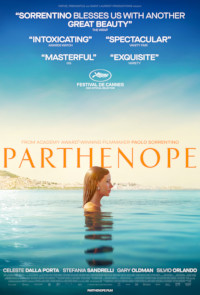 dir-scr Paolo Sorrentino prd Ardavan Safaee, Paolo Sorrentino, Anthony Vaccarello, Lorenzo Mieli with Celeste Dalla Porta, Stefania Sandrelli, Gary Oldman, Silvio Orlando, Luisa Ranieri, Isabella Ferrari, Silvia Degrandi, Lorenzo Gleijeses, Daniele Rienzo, Dario Aita, Marlon Joubert, Alfonso Santagata release It 24.Oct.24, US 7.Feb.25, UK 2.May.25 24/Italy Pathe 2h17 CANNES FILM FEST Is it streaming? |
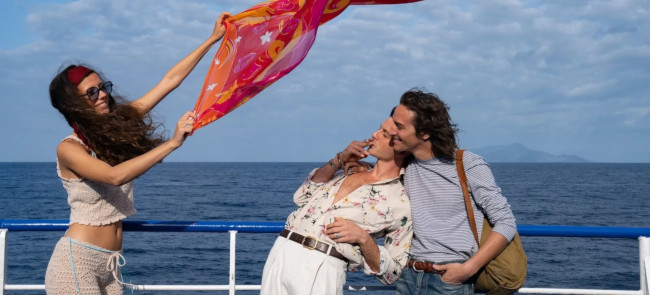 Another achingly beautiful odyssey from Italian filmmaker Paolo Sorrentino, this film opens pointedly with a Louis-Ferdinand Celine quote: "Life is so vast that you get lost everywhere". Spanning decades in a woman's life, the overlong narrative feels a bit random as it drops into one fascinating sequence after another, often with surreal touches. But the settings and designs are so ravishing that the film becomes almost dazzlingly gorgeous. In 1968 Naples, 18-year-old Parthenope (Dalla Porta) tantalises the local boys with her effortless grace. Even her older brother Raimondo (Rienzo) is mesmerised, and her parents (Degrandi and Gleijeses) aren't sure what to do with her. In a nearby resort, she meets American writer John Cheever (Oldman), whose stories she adores. He helps her see the power her beauty can give her. Over the years, she also learns about life from her grumpy anthropology professor (Orlando) and the maid's lovelorn son (Aita), and she has various encounters with people who are wealthy, famous or powerful. Born in the sea, Parthenope is like her namesake siren, inspiring adoration among boys within the sound of her voice. And she is far more interested in desire than sex. Although there's plenty of that too, including an extraordinary sequence in which a young couple from two important families must perform the Great Fusion in front of an audience. Over the extended running time, the film follows Parthenope through anecdotes that build a sense of Naples' culture and history. To match the film's gliding tone, performances ripple with underlying passion, both romantic and familial, so performances have a relentlessly yearning quality to them. Dalla Porta is magnetic as Parthenope, even if the role itself is rarely more than wistful, which leaves her various liaisons feeling somewhat empty. Her most enduring connection is with Orlando's surly but ultimately sympathetic professor. Decades later, Parthenope is engagingly played by Sandrelli as a striking 73-year-old still making peace with her choices. Sorrentino is such a masterful filmmaker that there isn't a dull moment on-screen, even if it never feels like it is going anywhere. This is clearly a cinematic love letter to Naples itself. Indeed, Raimondo observes that it's impossible to be happy in the most beautiful place on earth. So the film mixes its gorgeous imagery with tragedy and lust in a way that's haunting. Perhaps the point is that life isn't about being happy; it's about appreciating the beauty and love that coexist with the pain.
| ||||
|
Two to One Zwei zu Eins Review by Rich Cline | 
| |||||
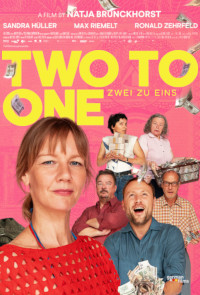 dir-scr Natja Brunckhorst prd Susanne Mann, Karsten Stoter with Sandra Huller, Max Riemelt, Ronald Zehrfeld, Ursula Werner, Peter Kurth, Martin Brambach, Kathrin Wehlisch, Anselm Haderer, Lotte Shirin Keiling, Robert Holler, Olli Dittrich, Uwe Preuss release Ger 25.Jul.24, US Oct.24 ciff, UK 2.May.25 24/Germany 1h56 Is it streaming? |
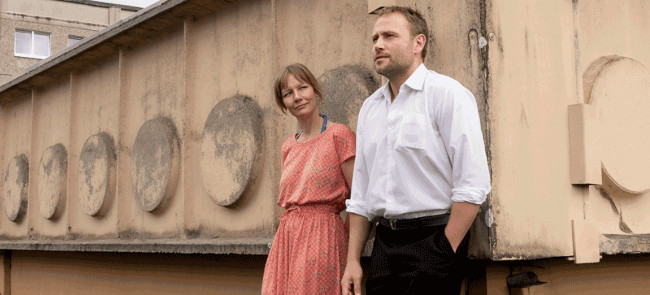 Mixing sparky humour with warm nostalgia, this finely produced German caper comedy follows four people who concoct a wild idea to trade their communist past for capitalist wealth. Writer-director Natja Brunckhorst keeps the focus on the characters, which helps hold the interest when the narrative begins to feel meandering and overlong. And while the true story develops in directions that aren't always entertaining or involving, it remains fascinating. In 1990, the Berlin Wall has just fallen, and East Berliners Maren (Huller) and Robert (Reimelt) are pondering a new reality for their family when their friend Volker (Zehrfeld) returns home from the West. While exploring a decommissioned state bunker with their friend Markowski (Kurth), they discover a mountain of useless old East German currency. But a loophole might allow them to spend it over the next three days while businesses can still accept it at a reduced exchange rate. So they enlist their neighbours to help spend as much as possible before the cut-off. Mini-adventures and low-key chases continually liven things up as this community's scam becomes increasingly elaborate, all while trying to avoid nosey police and government officials. The irony of course is that they are using communist cash to create their own collective group, sharing the profits. This also involves a bit of literal money laundering. In the final act, the plot takes a big swerve that isn't as much fun, even though it has more to say about global commerce. Characters are relaxed and likeable, with quirks that are never exaggerated. Huller grounds the story nicely as the matter-of-fact Maren, who enjoys the danger but never loses sight of reality. Her connections with both Reimelt's open-handed Robert and Zehrfeld's more intentional Volker create some nice camaraderie. This makes the underlying tension between them feel a bit implausible, because conflicts feel concocted. There's also a key subplot that playfully explores questions in Maren's back-story, notably where Volker is concerned. While the story loses some steam along the way, getting bogged down in unnecessary details and wrinkles, the underlying idea about how money changes people resonates in a way that never feels overstated. Even when Volker says, "Greed eats brains," he's simply observing how the group begins worrying about their share of the cash and mistrusting each other. Later on, a larger picture emerges that pointedly positions the film within the historical record. But a tighter narrative would have made it more enjoyable and memorable.
| ||||

See also: SHADOWS FILM FESTIVAL © 2025 by Rich Cline, Shadows
on the Wall
HOME | REVIEWS | NEWS | FESTIVAL | AWARDS
| Q&A | ABOUT | TALKBACK | | ||||

